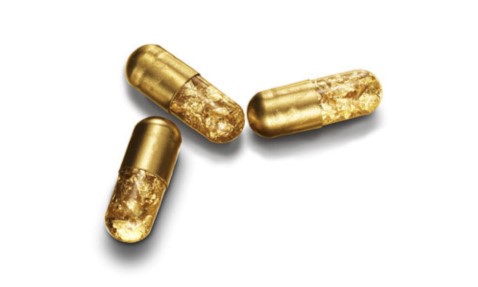It’s been said that Bitcoin has no true value. Fair enough. But neither does cash—and neither does gold. In fact, nothing in this world has value beyond that which human imagination gives it.
The designer gold pills that some obnoxious celebrity just swallowed have no real value, medicinal or otherwise, even though they cost $425 a piece. They’re designed simply to make what goes in, come out … gold. The imagination knows no limits.

(Click to enlarge) The gold you can eat, such as the $28,000 cupcake originating from Abu Dhabi, has no real value, though slightly more than the gold pills in the form of nutrients (sugar be damned).
The gold you can drink in Goldschlager, or smoke in the Dominican gold cigar, means nothing, either--not even in terms of taste.
The value of the gold bullion stored away in a safe somewhere is also elusive and a product of the imagination.
Value, then, does not exist beyond vanity.
Human beings like gold because someone a very long time ago decided that it would be a suitable token of trade, a thing with which to barter that wouldn’t tarnish, rust or fade away. Plus, it was shiny, and that always helps.
It also helped that while rare, there seemed to be enough of it to make it sought-after, but not oversupplied. Something that’s exceedingly rare wouldn’t work, nor would something too easy to come by. Gold struck the perfect balance.
But since those ancient times, our obsession with gold has become something much more. Now it’s solid 24K.
As the late, great British author Terry Pratchett wrote in Small Gods, “Belief shifts. People start out believing in the god and end up believing in the structure.”
He also wrote: “You can’t inspire people with facts. They need a cause. They need a symbol.”
And that is exactly what gold is for humanity today: An almost unshakable structure that is thoroughly symbolic, as is its value.
Now, not for the first time in history, the advent of a new type of currency is threatening gold’s status as the most powerful small god of our age-old barter system.
True believers in gold will argue that cryptocurrencies—whether they be bitcoin, ethereum, ripple or 1,500 other variations—aren’t real. And they are right, but they’re hoping that no one realizes that gold also lacks ‘true value’.
Related: Is Barrick Gold Close To Finding A Bottom?
Having divined a currency through our own imaginations, the only way to place any sort of value on it was to see how many people wanted it and what they were willing to pay for it. (What one might, in the modern day, call the ‘market’).
Crypto challenges the idea of ‘value’ even further by boldly claiming to exist without existing. Floating around in the cryptosphere like an intangible promise of payment—like a precious metal on a virtual reality tour—digital coins are easy targets for gold fundamentalists.
These are two small gods vying for believers, because without believers they don’t exist. It’s frightening for gold, because this one small crypto god is actually hundreds of gods banning together to slap reality in the face.
Gold might also argue in its own defense that it is rare, and there are limits to how much the Earth has to offer—adding to its natural allure. But Bitcoin has limits, too: They are written into the code, making the number of coins that can ever be ‘mined’ finite.
And they are real. We’ve made them real. We’ve given them value, even if we can’t decide whether it should be $20,0000 a coin or $8,000—or something entirely different. Volatility is the process of humans deciding whether they’re ready to convert.
Make no mistake. Currency is a religion, but there’s room for more than one.
By David Craggen for Safehave.com
More Top Reads From Safehaven.com:
















